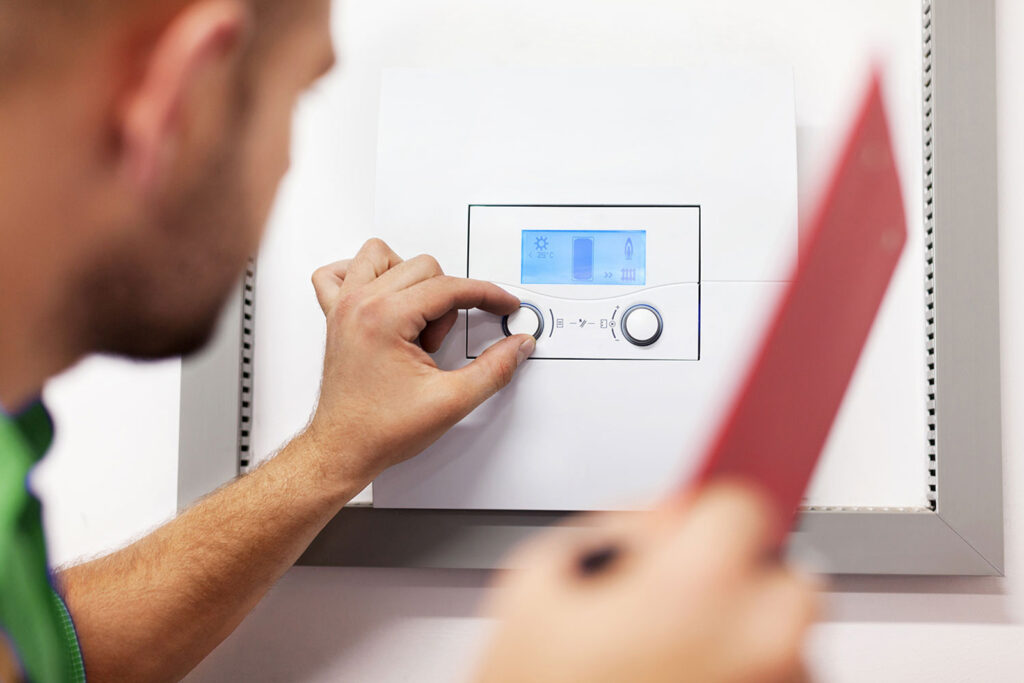
What pressure should my boiler be?
Your boiler needs to have just the right amount of pressure for hot water to properly circulate around your house. For most systems, the pressure gauge needle should be between one and two bar.
In this blog, Woolfoot Heating will show you what to do if your boiler pressure isn’t optimal, and how you can spot any potential pressure problems.
Boilers need to be at the right operating pressure for your hot water and heating system to function properly.
If your boiler loses pressure, or if the pressure gets too high, this could cause it to shut down – which is also know n as ‘lockout’.
The question is, what pressure should your boiler be?
It doesn’t matter whether you have a Worcester Bosch, Baxi, Vokera, Intergas, Vaillant or other brand of boiler, their operating pressures will all be very similar.
You can discover your boiler’s pressure by checking its pressure gauge, which is usually found on the front of its housing. The gauge has a small needle pointing at numbers often within green and red sections.
Alternatively, some boiler models will have an LCD display to show the pressure.
What should my boiler pressure be when the heating is on?
When you turn your heating on, the pressure should read between 1.5 and 2 bar (the bar is a metric unit of pressure). Most boilers highlight the ‘normal’ area in green on their pressure gauge to help you work out if the needle is indicating the right amount of pressure. Many boilers also have the zones below one bar and above two bar marked in red so you can quickly identify any issues.
What pressure should my boiler be when it’s off?
When your central heating is off, the boiler pressure should be between 1 and 1.5 bar – so the needle should remain inside the green area of the pressure gauge.
It depends on what boiler model you have, but most manufacturers recommend an optimal working pressure of 1.3 bar when not in operation.
Some boilers actually have two needles on their pressure gauge – with a red needle serving as a marker and as black showing the current pressure. If your system has the right amount of pressure, then the two needles should be pointing to the same number when the boiler is off.
Generally speaking, your boiler pressure should always be between 1 and 2 bar. But it’s always best to check your boiler’s manual to ensure it’s operating at its optimal working pressure, or if you’re still unsure, ask your heating engineer about your particular model.
Should a boiler increase in pressure as it heats up?
As water is heated it expands, so when your heating is turned on, the expansion of the water in the system causes pressure to build up. The needle in the pressure gauge will start to move upwards, but this is nothing to worry about.
Is low boiler pressure dangerous?
If you see a sudden jump in pressure by at least 1 bar, or the gauge needle rises up into the red area above 2 bar, this could mean that there’s a fault with the boiler’s expansion vessel or pressure relief valve. If that’s the case, you’ll need to contact a qualified and certified service engineer to conduct a boiler repair.
The cost of a repair will vary depending on the extent of the problem. Many plumbers operate with fixed prices per hour, but it’s always advisable to check their credentials before agreeing any work .
What if the pressure is too high?
As your boiler fires up, the heated water expands and your pressure gauge will rise. With a properly-functioning expansion vessel, boilers are designed to control these quick leaps in pressure, so don’t worry if your boiler is showing a higher-than-expected pressure when you’re using both the central heating and hot water at the same time.
How to reduce your boiler pressure
If your boiler pressure remains high, follow these steps to help lower it:
- Turn off your boiler and wait for the system to cool down
- Check the boiler pressure gauge
- If it’s above 2 bar when the boiler is off and cold, the pressure needs to be reduced
- Make sure the relief valve or filling loop is tightly closed
- Bleed your radiators – this will release trapped air from your heating system
- Check if the boiler pressure has returned to its normal setting
If your boiler pressure continues to be too high, then the expansion vessel may need repressurising, or there is a fault with the filling loop.
How often should I check the boiler pressure?
You should check your boiler pressure monthly as a matter of course, and always re-check the pressure if you’ve been bleeding your radiators as it might drop below 1 bar.
It’s also a good idea to keep an eye on your boiler pressure before the cold weather kicks in every year so that you know your boiler is in good shape ahead of winter.
Are you looking for a professional and reliable boiler repair service in Leeds? Woolfoot Heating can service, maintain and repair all types of boiler, no matter how old. With our industry knowledge and expertise, we can diagnose problems, answer any questions you might have and offer you the right boiler solution. We are regulated by the Financial Conduct Authority and also offer Yorkshire’s longest new boiler guarantee. Find out more here. Call Woolfoot Heating on 0330 113 8555 or email enquiries@woolfootheating.co.uk.

